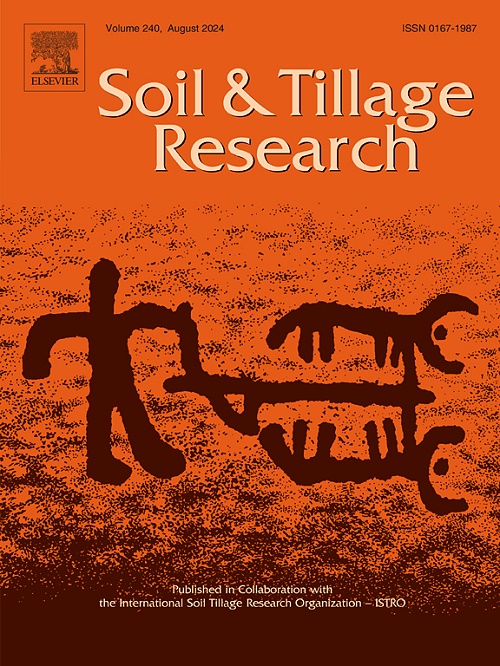Successive utilization of carbon from different biogenic sources leads to continuous enhancement of soil respiration
IF 6.1
1区 农林科学
Q1 SOIL SCIENCE
引用次数: 0
Abstract
Climate change affects soil organic carbon (SOC) by altering plant carbon inputs and microbial metabolic processes. On the Tibetan Plateau, which is rich in SOC and sensitive to climate change, investigations on the absolute SOC content affecting soil respiration (Rs) were extensive. However, the relationship between Rs and the SOC composition remains largely unclear. Employing a combination of data collection, large-scale field surveys, and analysis, with lignin phenols and amino sugars indicating plant and microbial SOC components, we observed an increase in Rs (3.747 kg C ha−1 yr−1) correlating with rising SOC stocks (0–30 cm; 8.6 kg C ha−1 yr−1). Our results showed that Rs is predominantly driven by plant-derived carbon, especially cinnamyl phenol carbon, which is significantly influenced by vegetation characteristics and soil properties. Although microbial-derived carbon has a minimal overall impact on Rs, fungal necromass carbon critically regulates Rs, underscoring the complex interactions between microbial- and plant-derived components under diverse environmental conditions. The rapid, short-term accumulation of plant-derived carbon significantly enhanced Rs and led to substantial microbial carbon accumulation. As the levels of microbial-derived carbon increase, the Rs process tends to utilize this carbon, potentially altering and reducing the SOC composition and stability, respectively, thereby leading to a continuous increase in soil respiration. These findings offer new insights into Rs and SOC dynamics within the grassland ecosystem of the Tibetan Plateau and provide a scientific basis for predicting the response of soil carbon to climate change.
对不同生物源碳的连续利用导致土壤呼吸作用持续增强
气候变化通过改变植物碳输入和微生物代谢过程来影响土壤有机碳(SOC)。青藏高原的土壤有机碳含量丰富,对气候变化十分敏感,因此对影响土壤呼吸作用(Rs)的土壤有机碳绝对含量进行了大量研究。然而,Rs 与 SOC 组成之间的关系在很大程度上仍不清楚。我们采用数据收集、大规模实地调查和分析相结合的方法,用木质素酚和氨基糖表示植物和微生物的 SOC 成分,观察到 Rs 的增加(3.747 千克碳/公顷-1 年-1)与 SOC 储量的增加(0-30 厘米;8.6 千克碳/公顷-1 年-1)相关。我们的研究结果表明,Rs 主要由植物源碳驱动,尤其是肉桂基酚碳,它受到植被特征和土壤特性的显著影响。虽然微生物衍生碳对 Rs 的总体影响很小,但真菌坏死物质碳对 Rs 起着关键的调节作用,这说明在不同的环境条件下,微生物和植物衍生成分之间存在着复杂的相互作用。植物源碳的短期快速积累显著提高了 Rs,并导致微生物碳的大量积累。随着微生物衍生碳含量的增加,Rs 过程倾向于利用这些碳,可能会分别改变和降低 SOC 的组成和稳定性,从而导致土壤呼吸作用的持续增加。这些发现为研究青藏高原草地生态系统中的Rs和SOC动态提供了新的视角,并为预测土壤碳对气候变化的响应提供了科学依据。
本文章由计算机程序翻译,如有差异,请以英文原文为准。
求助全文
约1分钟内获得全文
求助全文
来源期刊

Soil & Tillage Research
农林科学-土壤科学
CiteScore
13.00
自引率
6.20%
发文量
266
审稿时长
5 months
期刊介绍:
Soil & Tillage Research examines the physical, chemical and biological changes in the soil caused by tillage and field traffic. Manuscripts will be considered on aspects of soil science, physics, technology, mechanization and applied engineering for a sustainable balance among productivity, environmental quality and profitability. The following are examples of suitable topics within the scope of the journal of Soil and Tillage Research:
The agricultural and biosystems engineering associated with tillage (including no-tillage, reduced-tillage and direct drilling), irrigation and drainage, crops and crop rotations, fertilization, rehabilitation of mine spoils and processes used to modify soils. Soil change effects on establishment and yield of crops, growth of plants and roots, structure and erosion of soil, cycling of carbon and nutrients, greenhouse gas emissions, leaching, runoff and other processes that affect environmental quality. Characterization or modeling of tillage and field traffic responses, soil, climate, or topographic effects, soil deformation processes, tillage tools, traction devices, energy requirements, economics, surface and subsurface water quality effects, tillage effects on weed, pest and disease control, and their interactions.
 求助内容:
求助内容: 应助结果提醒方式:
应助结果提醒方式:


